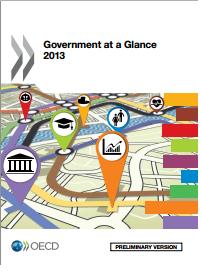European Commission, (2014), “EU Anti-Corruption Report”, COM (2014) 38 final. Corruption continues to be a big challenge for Europe – a phenomenon that costs the EU economy around 120 billion euros per year. Europeans are deeply worried about corruption – 76% of them believe that corruption is widespread according to a recent Eurobarometer survey.
Privatizations and Debt : Lessons From The Greek Fiascο
Manasse, P., (2014), “Privatizations and Debt : Lessons From The Greek Fiasco”, EconoMonitor Blog, 02 January. In the midst of the European Debt Crisis, it is tempting to think that high-debt countries could alleviate the recessionary impact of the budget consolidation process by selling (poorly managed) assets and stakes in their state owned enterprises (SOEs), and by using the proceeds to buy back their debts. In addition to providing a …Read More
A Eurozone Report Card 2013
Weeks, J., (2013), “A Eurozone Report Card 2013”, Social Europe Journal, 23 December. Three and one-half years ago the infamous Troika (IMF, European Commission and the European Central Bank, with the German government in close attendance) began its unsuccessful attempt to contain the crisis of the Eurozone, with a draconian austerity program for Greece. Subsequently, the Troika would add Ireland, Italy, Portugal and Spain to its list for the austerity …Read More
The primary response by Greek parties to the crisis has been to divert political accountability through populist blame-shifting
Vasilopoulou, S., Halikiopoulou, D. and Exadaktylos, T., (2013), “The primary response by Greek parties to the crisis has been to divert political accountability through populist blame-shifting”, LSE European Politics and Policy Blog, 18 December. Greece has been hit harder by the financial crisis than any other EU member state, with the economic fallout threatening to undermine the country’s democratic system. Based on an analysis of political speeches, Sofia Vasilopoulou, Daphne …Read More
The Re-Division of Europe
Papantoniou, Y., (2013), “The Re-Division of Europe”, Project Syndicate, 06 December. As the eurozone debt crisis has steadily widened the divide between Europe’s stronger northern economies and the weaker, more debt-laden economies in the south (with France a kind of no man’s land economy in between), one question is on everyone’s mind: Can Europe’s monetary union – indeed, the European Union itself – survive? While the eurozone’s northern members enjoy …Read More
Greece’s Reforms Have Only Cracked the Surface
Hatzis, A., (2013), “Greece’s Reforms Have Only Cracked the Surface”, The Wall Street Journal, 05 December. Last week Ángel Gurría, the secretary-general of the Organization for Economic Co-operation and Development, visited Athens to present the OECD’s latest economic survey of Greece. Since 2010, the report said, Greece “has made impressive headway in cutting its fiscal and external imbalances and implementing structural reforms to raise labor market flexibility and improve labor …Read More
Sources of tolerance towards corrupted politicians in Greece
Konstantinidis, I. and Xezonakis, G., (2013), “Sources of tolerance towards corrupted politicians in Greece: the role of trade-offs and individual benefits”, Crime, Law and Social Change, September. Reelection of corrupted politicians points to a problem of democratic accountability. Voters do have the chance to ‘throw the rascals out’, but they do not take it. Employing a survey experiment, we test two popular explanations of why Greek voters fail to effectively …Read More
Greece Needs a Fresh Start
Hatzis, A., (2013), “Greece Needs a Fresh Start”, The New York Times, Room for Debate Column, 01 December. During its tumultuous history modern Greece has always managed to be part of the winning alliances. Right after its independence Greece was attached to the powerful British Empire. In the two world wars Greece was an energetic ally of the western powers. After a ferocious civil war it saved itself from becoming …Read More
The Greek paradox
Karamouzi, E., (2013), “The Greek paradox”. In LSE, The Crisis of EU Enlargement, London: LSE !deas. In recent years, Greece’s place in the EU has been ferociously debated as Athens’ financial and economic woes continue to trouble the stability of the euro and rattle the Eurozone markets. Contemporary press and European political elites alike engage in a seemingly endless blame game over the political origins of the Greek financial crisis. …Read More
Government at a Glance 2013
OECD, (2013), Government at a Glance 2013, Paris: OECD Publishing. Government at a Glance 2013 provides readers with a dashboard of key indicators assembled with the goal of contributing to the analysis and international comparison of public sector performance. Indicators on government revenues, expenditures, and employment are provided alongside key output and outcome data in the sectors of education and health. Government at a Glance also includes indicators on key …Read More





